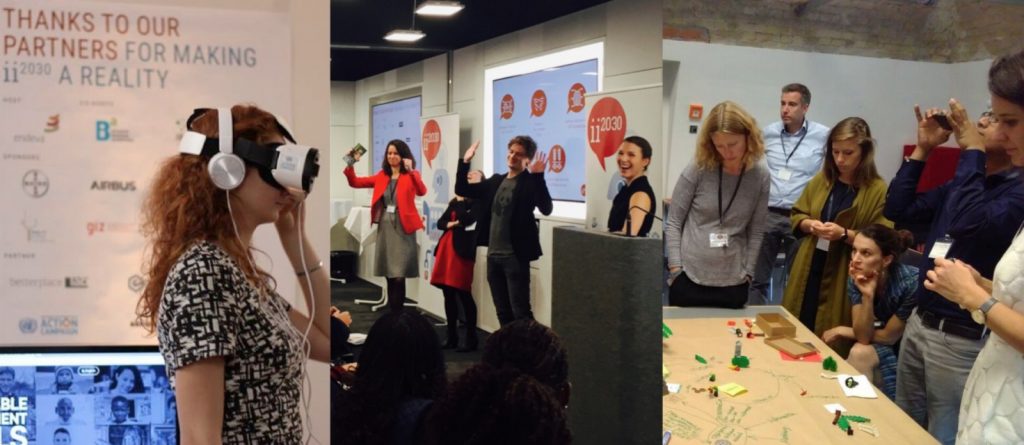“Go Natalia!”, “Group 4 rules” and more cheers show up behind the speakers. The crowd cajoles after every pitch. After 1,5 days of intense collaboration, the energy is still high. No, this is not startup night. It is the finale of Inclusive Innovation 2030 a new initiative by Endeva and partners to curate systems change. Pitches do not focus on business ideas, but on collaborative solutions to fix systemic issues. On October 18 and 19, ninety people went on tours through Berlin’s buzzling innovation scene and collaborated in a design thinking process. In 5 tracks, they explored technology-enabled opportunities to achieve the Sustainable Development Goals (SDGs). (For more detail, see our blogs on precision agriculture, AI-enabled BoP market data, intelligent diagnosis, drones for the last mile, blockchain.) What has been achieved? And what is next?
3 key ingredients
Would you like to try a new drink mixed together by a group of barkeepers? Sounds adventurous? But could be just awesome. ii2030 was created in a similar process, with some basic ingredients from Endeva, and our partners from IXDS, Inclusive Business Accelerator (IBA), Inclusive Business Action Network (IBAN) infusing their favourite flavours. Here are our three key ingredients:
- Curation: ii2030 was by-invitation-only, with an application process to bring in new players. Each of the tracks was curated by a host, who developed the challenge and solution hypotheses, and invited partners that play a role in this solution. For example, the challenge of how to make precision farming approaches available to small farmers brought together agrichemical company Bayer and machinery producer John Deere with social enterprise eKutir and NGOs Welthungerhilfe and HEKS, among others. This curation process yielded groups from widely different backgrounds in terms of sector, age and region, but with a common understanding of the problem and interest in the solution.
- Inspiration: Visiting a Mobisol solar home system installation in a village in Rwanda with Virtual Reality goggles. Tasting Syrian cuisine prepared by refugees. Remembering the fall of the Berlin wall on a bus ride to the next tour stop. Taking the time machine to 2030 and receiving a briefing by the pope. Meditating on the future of the earth. These and other elements of the ii2030 process invited participants to get in touch with their intuition and hopes, and to truly connect with each other.
- Facilitation: 1,5 days is not a lot of time to come up with a systems change initiative. The design thinking methodology powered by IXDS accelerated collaboration and ensured tangible results. Networking exercises during dinner and lunch established linkages across the tracks.
The mix worked. In the agri track, for example, participants designed an integrated market platform for small farmers, that will be piloted with eKutir in India. In other tracks, funding was already committed and roadmaps defined. We will make sure to keep these ingredients for the next edition of ii2030. But we will also experiment further.
Being inclusive in our innovation
By nature, this highly curated format is rather exclusive. Each track has space for only 12 participants. Happening in Berlin, it de facto excludes most entrepreneurs from the low-income markets our solutions are designed for. Technology provides an answer here, as well: participants can get involved online, provide their input and get updates on progress. Together with our online co-hosts IBA, we experimented with making the online discussion an integral part of the innovation process. The results are encouraging, but we still have a long way to go. IBA is a community of entrepreneurs from low-income countries mainly in the agri and energy sectors. As a result, input on the precision agriculture track was quite rich, while tracks on health or finance were less productive. Clearly, meeting people where they already are is critical. And there is much more we can do to integrate the on- and offline conversation, also during and after the event. Do you know of any good examples? We’re keen to learn from them!
Taking initiatives forward
Curating the tracks was a lot of effort. But the hardest part is yet to come: we need to keep the momentum and set up the initiatives we have designed together. The commitment by participants is encouragingly high, and we are now scheduling up follow up calls to translate the high-level visions created in Berlin into concrete action plans. We’re excited to see how the initiatives evolve. And even if we don’t achieve the big vision, we will at least have made some steps towards achieving the SDGs. If you want to link in with one the five initiatives, please let us know!
This blogpost was authored by Christina Tewes-Gradl, co-founder at Managing Director at Endeva and one of the driving forces behind ii2030.


